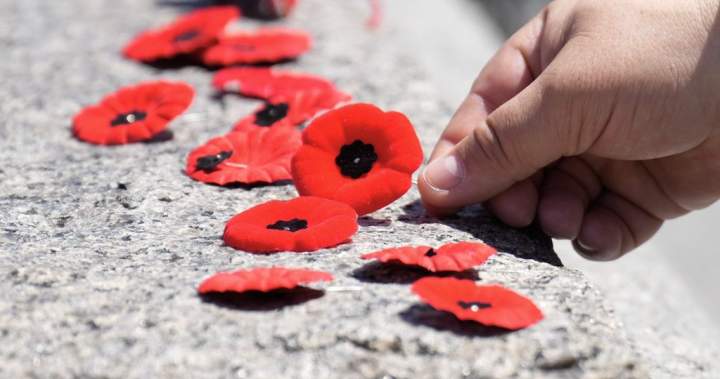The chief justices of Nova Scotia’s Supreme Court and Provincial Court are defending the decision not to allow staff to wear poppies in some courtrooms ahead of Remembrance Day, saying the topic is “very sensitive” and “deserves an explanation.”
In a statement on Sunday, Chief Justice Deborah K. Smith and Provincial Court of Nova Scotia Chief Judge Perry Borden said there can be “no signs of favouritism” during court proceedings.
“Judges have an obligation to conduct all court proceedings in an impartial and unbiased manner,” the judges wrote. “There can be no signs of favouritism towards any of the litigants.”
The judges went on to cite the Canadian Judicial Council’s Ethical Principles for Judges, which notes that while judges may wish to signal support for causes or viewpoints through words or wearing symbols of support, doing so could be interpreted as “reflecting a lack of impartiality.”
The judges’ comments come after criticism was raised, including by Premier Tim Houston, who called the decision “disgusting.”
The premier also threatened earlier this week that “if necessary” he would introduce legislation, the Nova Scotia Remembrance Day Act, to enshrine the right to wear a poppy in the workplace.
According to the judiciary, court staff members are required to receive the presiding judge’s permission to wear a poppy, which can be considered a “symbol of support.”

Get daily National news
Get the day’s top news, political, economic, and current affairs headlines, delivered to your inbox once a day.
“To ensure the fair administration of justice, the Courts must be neutral and appear to be neutral at all times, particularly inside the courtroom,” spokesperson Andrew Preeper wrote to Global News.
“Everyone appearing in court must feel that their case will be heard fairly and without bias. As a result, all judges and staff are expected not to wear any symbols of support in the courtroom.”
Preeper confirmed permission was within the discretion of the presiding judge.
Houston, in a lengthy social media post on Thursday, said the poppy “is not a political statement” and that the judges who issued the order “are wrong.”
“While I respect the independence of the judiciary, I respect veterans, the very people who made the ultimate sacrifice defending our country, our values and our democracy, more,” Houston wrote.
In their statement, both Smith and Borden said they remember the sacrifice made by veterans.
“We hope that there isn’t one of us who doesn’t remember the sacrifice that our veterans made to preserve our free and democratic society,” they wrote. “The wearing of a poppy symbolizes our respect for those who have served, and those who did not return. Why, then, would a judge ask staff not to wear a poppy in the courtroom?”
Because it is “fundamentally important” that any individual who walks into court sees and feels that they’re in a “totally unbiased and neutral space,” Smith and Borden said.
The judges provided an example of a non-veteran charged with assaulting a partner who is a “highly respected veteran” in the Canadian Armed Forces whose trial is hypothetically set to begin Nov. 10. If upon entering the courtroom the accused sees the judge, court clerk and sheriff all wearing a poppy, “that individual will likely have some discomfort or doubt about the neutrality of the proceeding,” Smith and Borden wrote.
“The decision of a judge not to allow symbols of support such as the poppy to be worn by court staff is not intended, in any way, to undermine or diminish the tremendous respect that we have for those who have served, and those who have died. It is to ensure that all Canadians know that they are entering an unbiased and neutral space when they enter a courtroom.”
Preeper added in his statement on Thursday that members of the public are welcome to wear poppies in the courthouse and courtroom.
Read the full article here
